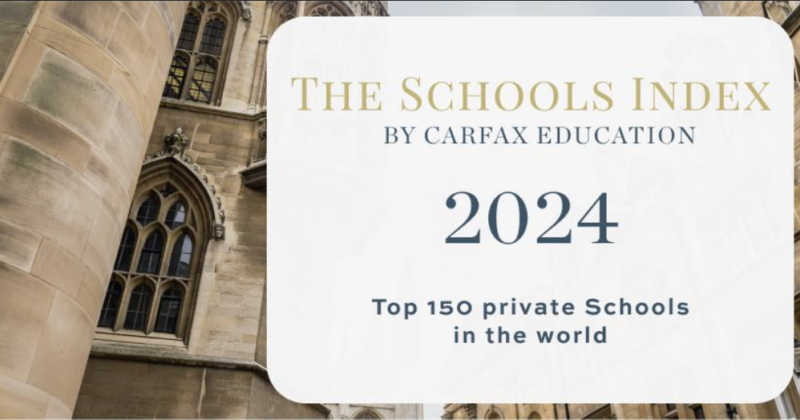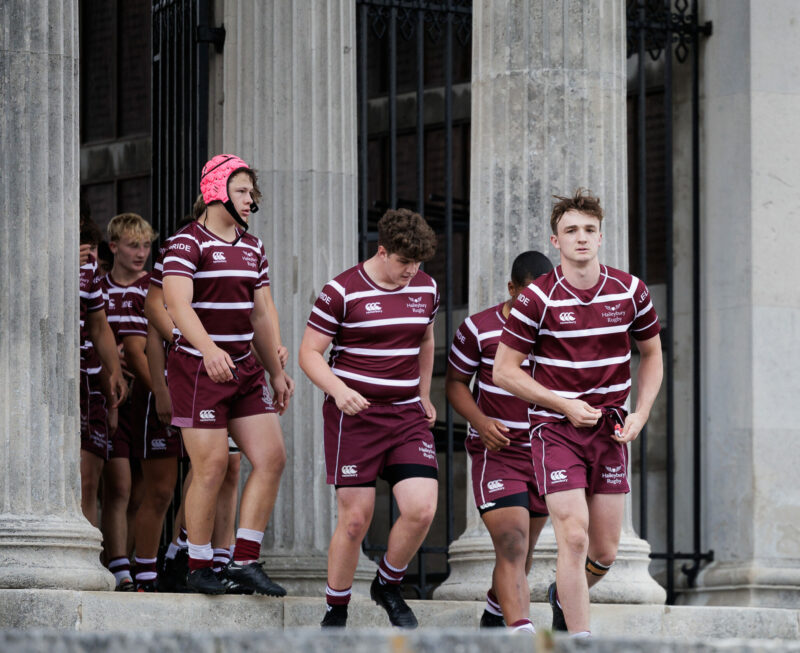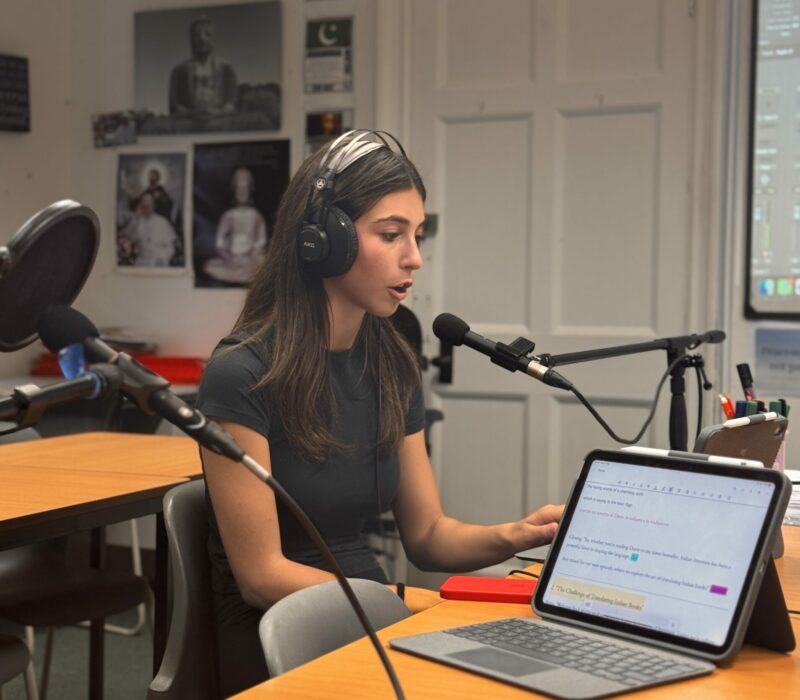This website uses cookies so that we can provide you with the best user experience possible. Cookie information is stored in your browser and performs functions such as recognising you when you return to our website and helping our team to understand which sections of the website you find most interesting and useful.
DAVID JOHN JEWELL
A Memorial Service for David Jewell, Master of Haileybury from 1987-1996, took place on Saturday 16 September 2006 in the Chapel at Haileybury.
A transcript of the addresses given by current Master, Stuart Westley, by David Jewell’s daughter, Sarah, and by The Rt Revd Bishop John Taylor appear below.
Address by Stuart Westley
Family, colleagues and friends gather today to give thanks to God for David’s life, a life lived gloriously to the full for 72 years. Many were privileged to know David; we will all cherish vivid recollection of his remarkable intellect, his catholic interests, his deep faith, his flair with words, his remarkable memory, his sincerity and lack of pretentiousness and, perhaps above all, his infectious sense of humour. Is there one of us here in whom recollection of David does not induce a smile? I doubt it.
The far west of Cornwall provided the foundation for David’s young life. As the son of an RAF Officer the early years were inevitably rather nomadic but to Cornwall he regularly returned. The beauty of the county and the traditions of close-knit fishing community were strong influences which remained with David all his life. His deep, abiding interest in both music and the Church grew from the Methodist tradition of Cornwall. He learned to sing with unrestrained joy and honed what was to become a fine, distinctive base voice. Boarding school life at Blundell’s nurtured David’s intellect and his life-long love of games. School was followed by National Service and a Commission in the RAF, including an early taste of responsibility when David was in charge of the defence of North Weald at the tender age of 20. Through the service, he discovered his gift as a teacher and developed those administrative skills which enabled him to discharge major responsibility so impressively later in life.
At St John’s College, Oxford, as a Choral Exhibitioner, his musical talent continued to grow. David was conductor of the College Singers and a member of the Opera Club and the Bach Choir. He emerged from Oxford with two degrees and, perhaps his most precious asset, Katharine, his intellectual equal, very soon to become his devoted wife and most loyal supporter.
David’s first teaching appointment was at Eastbourne College where his obvious talent earned him promotion to the post of Head of Science after just three years. In 1958 he moved to Winchester, enjoying the intellectual cut and thrust of that distinguished institution, taking a keen interest in the affairs of the Labour Party of the City. After nine years, judging Winchester not to be quite the real world, he made a typically imaginative, courageous move to be Deputy Head and Head of the Sixth Form of Lawrence Weston Comprehensive School, on the outskirts of Bristol, providing for the educational needs of the children of the workforce of Avonmouth Dock and neighbouring Severnside enterprises. After just three years, only 36 years old, David was appointed Head of Bristol Cathedral School, then a Direct Grant School. He was justifiably proud when, following thorough scrutiny by Her Majesty’s Inspectors, the Cathedral School was awarded the status of one of the top ten schools in its category. In the mid ’70s the School faced the loss of its precious, distinctive identity when the Direct Grant was abolished. Courageously choosing the route of independence, with little in the way of material resource, David presided over the battle for survival of the School, and of the Cathedral Choir as an integral part of it, and emerged triumphant. Bristol Cathedral School remained a beacon of musical and artistic style and excellence and punched well above its weight academically in Bristol’s particularly competitive independent school environment. David moved on to his second Headship at Repton, a major boarding school, in 1979. By then David had become a champion of the cause of independent education. He had learned the professionalism and the managerial skills to complement his abundant natural talent which enabled him to lead very successfully Repton and, from 1987, Haileybury.
A national reputation was burgeoning as David sought to express his own deep convictions to a wider audience. His agile mind, quick wit and ready repartee made him something of a favourite of the media. He held his own effortlessly with the biggest of hitters. In the late ’80s he was called to defend the then new GCSEs and was challenged over failure rates. Quick as a flash, David had the answer "You can’t fail GCSEs". As an established Head, David had become a passionate advocate of the virtue of independent education, not as a means of privilege, for David was quick to detect and bitterly opposed any form of privilege. His belief was in equality of opportunity and the provision of opportunities in abundance. David admired the traditions of British independent schools. He saw independence of education as an opportunity to benefit pupils, including disadvantaged ones; he championed the Assisted Places scheme for extending access to the benefits of such an education. The concerns of his Chairman’s address to HMC in 1990 included the recruitment and retention of good, young teachers, the importance of breadth in education and independent schools playing a responsible, generous spirited role within the community. Sixteen years later those sentiments have a remarkably contemporary ring. ‘Philanthropy and altruism’ he reminded us all ‘are part of our tradition’. The fortunate sector has a duty to ask what it can do to serve the education of the nation as a whole; it should be proud to be different, not hesitant and apologetic. The theme of David’s Conference was ‘Service’; for him there could be no other. He didn’t hesitate to quote the example of this school’s most famous old boy, Clement Attlee, whose life David regarded as a life of service from childhood, following his experience of the Boys’ Club in Stepney, through the local politics of that area, to service in the highest office in the land. Attlee’s first contact with the Haileybury Boys’ Club, as he wrote in his autobiography, "as it happened was an event which was destined to alter the whole course of my life".
Serve and above all, recognise we are here to serve God. To Chapel David went every morning with his various communities to praise God for His abundant gifts without a moment’s hesitation, as the boys at Repton were to discover, rather to their surprise. Going straight to the heart of the matter which was so characteristic, David invited us to consider ‘There but for the grace of God go I’. Remove grace and God and observe how little is left.
After retirement David continued to throw himself into service contributing to the governance of Blundells, his old school and Truro School, where he was vice Chairman at the time of his death. Finally re-established in Cornwall, not yet two years ago, David immediately volunteered for the responsibility of treasurer of the Parish Council. David relished the larger picture, the big brush stroke. His visions resonated amongst all with whom he had contact. His concept of educating the young was broad and generous, he passionately wanted them to experience the delight of Bach, Elgar, Shakespeare or Matisse and the scrum and the cover drive too. Questioned by colleagues about academic targets and ambitions, his reaction, in a characteristic moment of frankness, was that rigorous selection and too much emphasis on results made for a cold atmosphere. But he wanted an achieving school and was very appreciative of successes at A Level and Oxbridge, and ready to say so.
Heads have to face up to issues and inevitably David’s strong convictions, his restlessness and competitive nature sometimes led to conflict. Some thought him hasty and at times too adversarial.




